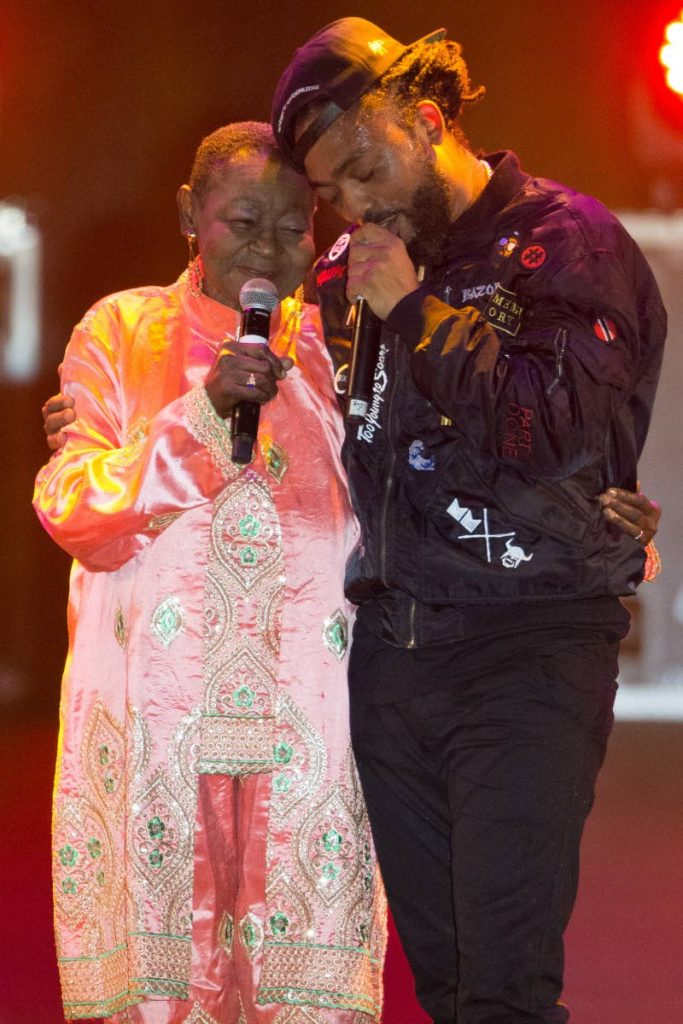Sexual healing

Calypso Rose’s (McArtha Lewis’) latest song, Young Boy, merely reflects the traditional stereotypes that have long been ascribed to male-female relationships, particularly among older people.
This is the view of at least two academics, who spoke to Sunday Newsday about the song, which is a collaboration with soca superstar Machel Montano. They also sang the duet Leave Me Alone in 2017.
The song, produced by Canadian/Belizean platinum producer Ivan Duran, is essentially a conversation between Rose and another woman, Angela, who has experienced much stress in her previous marriage.
In response, Rose, presumably speaking from experience, encourages Angela to get a young boy for companionship.
“You will cry no more/ To spend yuh money / And call yuh honey / Who will wipe yuh eye / And tell yuh doh cry / Who will kiss you in yuh ear / And call you my dear,” Rose sings in the chorus.
And while age has never been a deterrent in Rose’s career, the 78-year-old’s latest contribution can be seen in some quarters, as pushing the boundaries, even for her, in addressing issues of sexuality, especially among older people.
Head of the Institute of Gender and Development Studies Dr Gabrielle Hosein said the song can be taken at face value given the historical stereotypes that have long defined male-female relationships. “The song is playful, centering women’s sexual desire in the traditional way that men exchange older women for young ones as second marriages or outside women or as visiting relationships and in the ways that men have traditionally sexualised youthful femininity,” she said.
Hosein added: “The song takes everything that is long normalised about men’s desires and relationships with women and plays it as a mas, giving women a chance to express such desires, despite much hypocrisy that sees them as inappropriate or scandalous.”
According to Hosein, whose research encompasses Caribbean feminism and Indo-Caribbean feminist theorising and sexualities, Young Boy gives older women a chance to show themselves as sexually desiring and able to enjoy openly relationships with younger men. She said it also invites “younger men to play up their sexual sweetness and ability to care, please and perhaps, may usefully encourage older men to come better than before.” Historian Dr Jerome Teelucksingh said the scenario presented in Young Boy was neither unique or unconventional.
He said: “Young Boy is a song of advice to a woman released from a marriage full of stress and heartbreak.
“This is neither a unique scenario nor unorthodox, such incidents and advice have occurred and will occur in the future.”
Teelucksingh observed while most of the songs and costumes in Carnival over the years, have reflected the social mores “of an increasingly liberal society,” conservative-minded people would be appalled by the song’s lyrics.
He said the song presented a one-sided view of marriage.
“It suggested that marriage was a burdensome institution and that a fling with a younger male is ideal and will create a better life.”
A lecturer in the Department of History, UWI, St Augustine, Teelucksingh said some attention should have been paid to the psychological and emotional impact of the relationship on the “young boy.”
“Suppose the ‘young boy’ wants to marry this ‘free’ woman or later dumps her for another older woman?”
Teelucksingh said the song carries a subliminal message
“Calypso Rose mentions the husband (of the woman) causing ‘misery’ and sadness, had an extramarital affair with a younger woman, and that his death creates a ‘freedom’ for the grieving widow. “But few people might realise that this is a dangerous generalisation because not all husbands display these shortcomings.”
He said the lyrics also reflect another stereotype; that of the husband or father being the main culprit for a rocky marriage. “Some of the lyrics have stigmatised and demonised the husband as being the sole perpetrator of the sadness and marital problems.
“The song makes us reflect on a question that some of us tend to evade, ‘Is the husband responsible for all the problems in a relationship or marriage?’”


Comments
"Sexual healing"